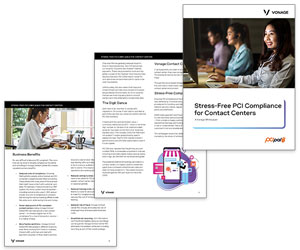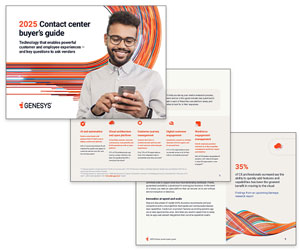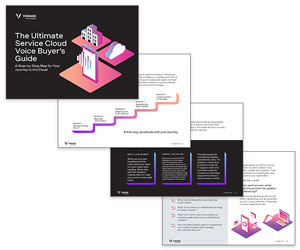In this new Trade Secrets feature we look at how you can get the most out of your existing technology.
Here are 12 top tips on getting the best out of your ACD/call-routing system.
1. Call your own contact centre
It’s easy to get caught up with the day-to-day administration of the business and lose sight of the bigger picture.
Why not try and call your contact centre? Using the publicly available literature, see how difficult it is to locate the right number, or to get through to the right department using the auto attendant.

Tony Hesketh
2. Give your system a spring clean
As small changes are made over the years, additional options are added and new marketing campaigns are created, the contact centre can become cluttered.
It is important to schedule a spring clean of your system; take a step back and ensure that new additions are working effectively with the existing infrastructure.
3. Identify the caller
Get the best out of your ACD or call-routing system by reducing customer effort.
Using the technology at your disposal, why not try and identify the caller without having them enter countless pieces of information. Also try to anticipate not just who is calling, but why they are calling.
Such proactive use of your system can only benefit the customer experience.
With thanks to Tony Hesketh, Director, Solutions Consulting, Aspect Software

Richard Piatkowski
4. Update messages in your IVR and change your hold music
Update the messages in your IVR and change your hold music. Regular callers get really bored with the same stuff, so mix it up once in a while.
With thanks to Richard Piatkowski, Interactive Intelligence
5. Make it very easy for customers to access the most popular services

Laura Campos
Make it very easy for customers to access the most popular services and reach an advisor by hitting just one button should they need assistance.
Plan your customer experience precisely and take the time to map out each IVR route; if you have chosen to work with a cloud technology provider, they will help you with the set-up and will also monitor your campaigns’ performance.
With thanks to Laura Campos, Ultra Communications
6. Ensure that supervisors have real-time access to ACD configurations
Ensure that supervisors have real-time access to ACD configurations for advisors, groups, skills and queues so that they can respond flexibly and promptly to changes in demand and to advisor absence.
When supervisors are challenged with service peak calls or need to cover for unexpected absences, they have a flexible adjustment mechanism, enabling them to match call handling to demand and maintain service levels.
7. Provide every advisor with a default skill set that resets at midnight
Provide every advisor with a default skill set that resets at midnight.
This enables supervisors to achieve maximum use of available resources on any particular shift, and unexpected events are not carried forward.
8. Implement a process of single sign-on at the start of the shift
Implement a process of single sign-on at the start of the shift. Advisors log in once and only log out as they shut down for the day. All other absences are on a walk-away code.
This continuity of log-in removes fragmented management information and allows supervisors to allocate advisors as required during the shift.
9. Make full use of skills-based routing

Richard Farrell
Skills-based routing ensures that all calls are answered by the most appropriate advisor.
Advisors log into their group, groups have multiple queues. Each advisor has a skill level per queue. The skill level determines who answers first, calls can be backed off to wait for a skilled advisor, or in times of peak demand, less-skilled advisors can take the call and provide a follow-up action with a more skilled advisor. This helps to maintain customer satisfaction and agent morale.
10. A blended ACD environment promotes efficient working
A blended ACD environment promotes efficient working and increases advisor morale as additional effort is easily recognised.
Current best practice is to ensure that all contact handling, regardless of channel, is through the ACD. All contact types should be presented to the Contact Centre Application for handling by queues and skill levels of advisors.
Separate systems can lead to uncoordinated contact management and fragmented management reports. A single system provides a clear instant view of the metrics and enables the supervisor to flexibly manage advisor activity.
With thanks to Richard Farrell, Netcall

Jonathan Gale
11. Treat all callers as individuals
Not all customers have the same requirements, so they shouldn’t have to go through the same menus every time.
Modern call-routing technology can identify callers by their call history to direct them to the most appropriate agent first time.
With thanks to Jonathan Gale, NewVoiceMedia
12. Use an overflow queue
After a time threshold, say 2 minutes, route calls into an overflow queue with a higher priority. The overflow could be to a back-office team that does not normally take front-office calls.
You need to be careful if you are playing messages to callers with the time in queue or the longest call waiting, as overflow calls with a higher priority will effectively jump the back-office queue.
Do you have any tips on getting the best out of your current ACD/call-routing system?
Author: Megan Jones
Published On: 9th Oct 2013 - Last modified: 17th Dec 2024
Read more about - Hints and Tips, Alvaria, Call Routing, Genesys, Jonathan Gale, Ultra, Vonage



















Numbers 6 & 7 suggest changes on the day to skills and call routing. Have to say I completely disagree with those “tips” the A in ACD stands for automatic. In a complex environment you don’t really understand the impact of making a change, it may create an issue against another queue. Also if you are making changes, things have already started to go wrong, build conditional routing that automatically fixes issues, before you even become aware, that’s why you bought an ACD isn’t it?